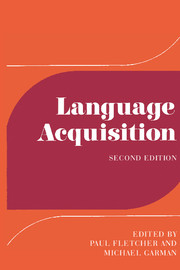Book contents
- Frontmatter
- Contents
- Contributors
- Preface
- Part I Contexts and determinants
- Part II The development of linguistic systems: phonology
- Introduction
- 7 Prespeech segmental feature development
- 8 Prosodic development
- 9 Early strategies for the perception and production of words and sounds
- 10 Phonological development: production
- 11 Speech perception and the emergent lexicon: an ethological approach
- 12 Phonological development: a crosslinguistic perspective
- Part III The development of linguistic systems: grammar
- Part IV Later language development
- Notes to chapters
- Bibliography and citation index
- General index
- Titles in the series
Introduction
Published online by Cambridge University Press: 05 June 2012
- Frontmatter
- Contents
- Contributors
- Preface
- Part I Contexts and determinants
- Part II The development of linguistic systems: phonology
- Introduction
- 7 Prespeech segmental feature development
- 8 Prosodic development
- 9 Early strategies for the perception and production of words and sounds
- 10 Phonological development: production
- 11 Speech perception and the emergent lexicon: an ethological approach
- 12 Phonological development: a crosslinguistic perspective
- Part III The development of linguistic systems: grammar
- Part IV Later language development
- Notes to chapters
- Bibliography and citation index
- General index
- Titles in the series
Summary
Four of the chapters in this section are revised versions of essays that appeared in the first edition – those by Stark, Crystal, Menyuk, Menn and Silber and by Ingram. The chapters by Locke and Macken are new, and represent developments since 1979 in the areas of the child's phonological perception, and crosslinguistic perspectives on language development. In this volume, all the chapters on the child's phonetic and phonological development, segmental and nonsegmental, are here brought together within one section.
The child's vocal behaviour in the first year or so is dealt with in the chapters by Stark and Crystal. Stark concentrates on recognizably segmental aspects of production, and Crystal on the antecedents of prosodic development. Stark, after a historical review of work in the area of prespeech segmental development, concludes that while it is now generally agreed that there are levels or stages in the child's vocal behaviour over his first year, we still do not understand the processes underlying the shift from one kind of behaviour to another in the early part of life. After reviewing specific findings from both studies using auditory-impressionistic transcriptions and those which rely on instrumental analysis, Stark details the stages through which children seem to pass, successively: reflexive crying and vegetative sounds, cooing, vocal play, reduplicated babbling, and non-reduplicated babbling. She concludes by relating these behaviours to what is known of the changing anatomy of the infant vocal tract and his developing central nervous system.
- Type
- Chapter
- Information
- Language AcquisitionStudies in First Language Development, pp. 143 - 148Publisher: Cambridge University PressPrint publication year: 1986



